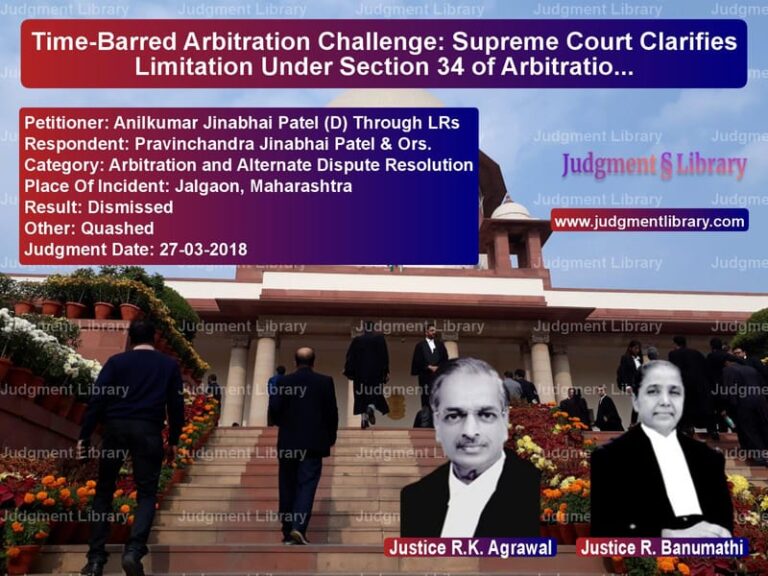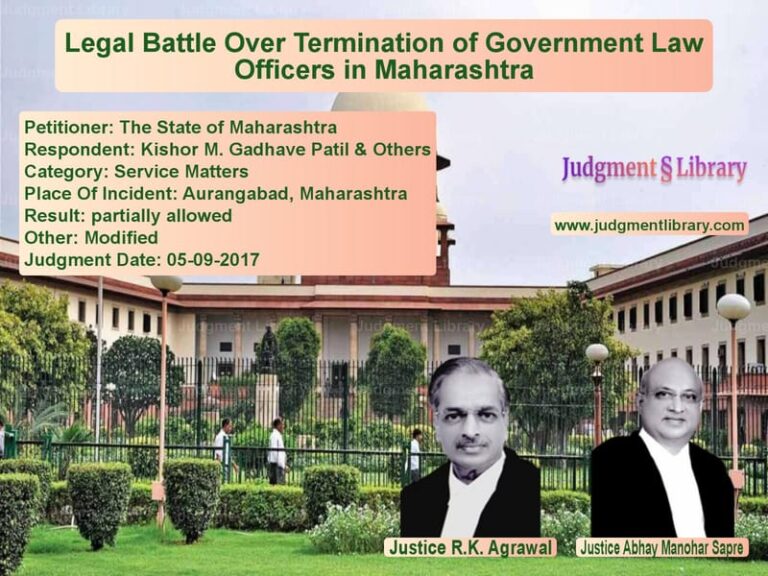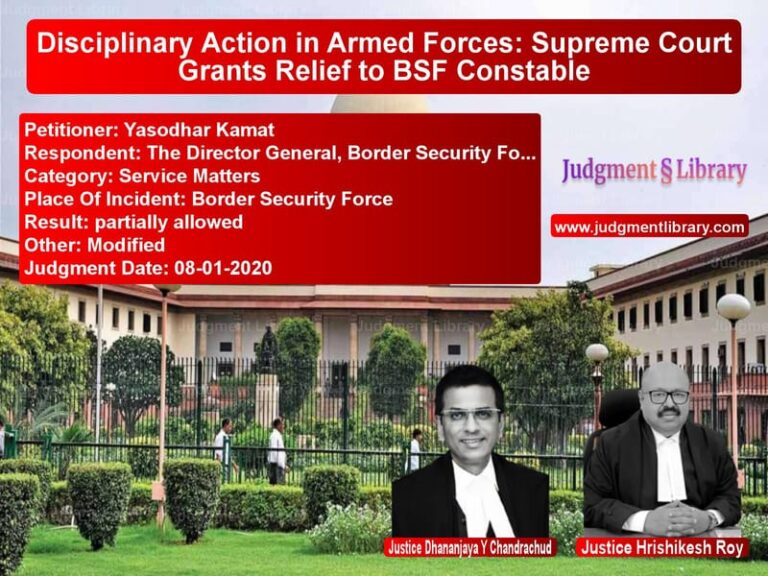Private College Fee Regulation: Supreme Court Upholds Telangana Fee Fixation Policy
The Supreme Court of India, in its judgment dated July 1, 2019, delivered a significant ruling in the case of Vasavi Engineering College Parents Association v. State of Telangana. The case revolved around the legality of the fee structure set by the Telangana Admission and Fee Regulatory Committee (TAFRC) for private unaided professional institutions. The Supreme Court upheld the regulatory authority’s decision, reinforcing the principle that courts should not interfere in expert determinations unless there is clear illegality or arbitrariness.
Background of the Case
Following the precedent established in Islamic Academy of Education v. State of Karnataka, each state was required to establish a Fee Regulatory Committee to oversee fee structures in private unaided educational institutions. Telangana implemented the Telangana Admission and Fee Regulatory Committee (TAFRC) Rules, 2006, under the Telangana Educational Institutions (Regulation of Admission and Prohibition of Capitation Fee) Act, 1983.
The controversy arose when the TAFRC determined the fee structure for B.E. and B.Tech courses for the block period 2016-17 to 2018-19. The private colleges challenged the fee fixation, arguing that the committee’s methodology was flawed and that the fees approved were insufficient to cover operational expenses.
Key Events Leading to the Supreme Court Appeal
- The TAFRC initially set the fee for private colleges at Rs. 86,000 and Rs. 91,000 per student for the academic years 2016-2019.
- The private colleges challenged this fee in the Telangana High Court, arguing that the amount was inadequate to meet infrastructure and faculty expenses.
- The High Court remanded the matter to the TAFRC, which then revised the fee to a uniform Rs. 97,000 per student.
- The private colleges again contested this decision, leading the High Court to override the TAFRC and fix fees at Rs. 1,60,000 and Rs. 1,37,000 per student.
- The Telangana government and the parents’ association challenged the High Court’s decision before the Supreme Court, arguing that the judicial interference was unjustified.
Supreme Court’s Observations
The Supreme Court examined whether the High Court had overstepped its jurisdiction by interfering in the TAFRC’s decision-making process. The key observations made by the Court were:
- The TAFRC is a statutory body consisting of domain experts, including a retired High Court judge, finance and legal experts, and education specialists.
- The High Court had no jurisdiction to replace the expert findings of the TAFRC with its own calculations.
- The committee had properly considered various economic factors, including inflation and operational costs, while setting fees.
- The regulatory authority had followed the due process, consulted with institutions, and reviewed financial records before arriving at the fee structure.
The Court stated:
“The findings of the High Court that the TAFRC did not act fairly and justifiably in determining the fee structure are incorrect. The power of judicial review cannot extend to substituting the view of the court for that of the expert body.”
Arguments of the Parties
Arguments by the Private Colleges:
- The TAFRC had unreasonably restricted the fees, resulting in financial losses.
- They had incurred expenses exceeding the approved fees and needed a higher amount to maintain quality education.
- The High Court’s fee determination was based on actual financial needs, unlike the TAFRC’s arbitrary decision.
Arguments by the Telangana Government & Parents’ Association:
- The TAFRC followed proper methodology and ensured a balance between affordability for students and sustainability for institutions.
- The High Court lacked jurisdiction to fix fees when a statutory authority was in place.
- The revised structure ensured no profiteering or capitation fees while allowing reasonable operational costs.
Final Verdict
The Supreme Court ruled in favor of the Telangana government and the parents’ association, overturning the High Court’s decision. It held that:
- The TAFRC’s fee structure of Rs. 97,000 per student is legally valid and binding.
- The High Court exceeded its jurisdiction by directly determining fees.
- Courts should refrain from interfering in regulatory decisions unless there is clear illegality, irrationality, or procedural unfairness.
- The private institutions must abide by the fee structure fixed by the TAFRC.
The Court also directed:
- The private colleges must comply with the fee structure for the block period 2016-19.
- Bank guarantees furnished by the colleges during litigation must be executed as per legal provisions.
Conclusion
This judgment reinforces the authority of regulatory bodies in determining fee structures for private educational institutions. The Supreme Court’s ruling ensures that fee fixation remains within the purview of expert committees rather than judicial interference. The decision protects students from excessive fees while allowing institutions to operate sustainably.
Petitioner Name: Vasavi Engineering College Parents Association.Respondent Name: State of Telangana and others.Judgment By: Justice Navin Sinha, Justice Arun Mishra.Place Of Incident: Telangana.Judgment Date: 01-07-2019.
Don’t miss out on the full details! Download the complete judgment in PDF format below and gain valuable insights instantly!
Download Judgment: Vasavi Engineering C vs State of Telangana a Supreme Court of India Judgment Dated 01-07-2019.pdf
Direct Downlaod Judgment: Direct downlaod this Judgment
See all petitions in Education Related Cases
See all petitions in Fundamental Rights
See all petitions in Public Interest Litigation
See all petitions in Legislative Powers
See all petitions in Constitution Interpretation
See all petitions in Judgment by Navin Sinha
See all petitions in Judgment by Arun Mishra
See all petitions in allowed
See all petitions in Remanded
See all petitions in supreme court of India judgments July 2019
See all petitions in 2019 judgments
See all posts in Constitutional Cases Category
See all allowed petitions in Constitutional Cases Category
See all Dismissed petitions in Constitutional Cases Category
See all partially allowed petitions in Constitutional Cases Category







